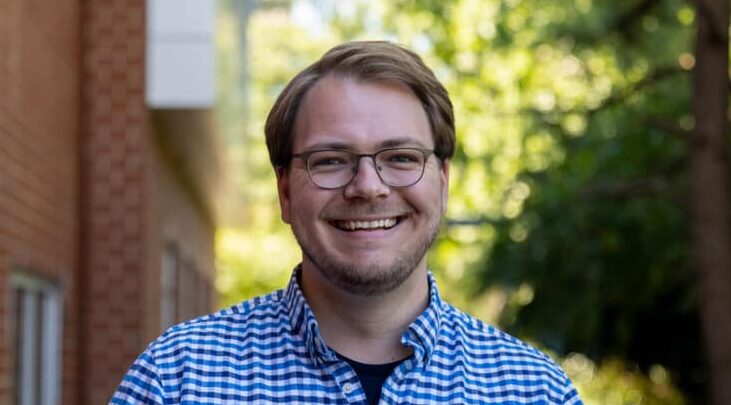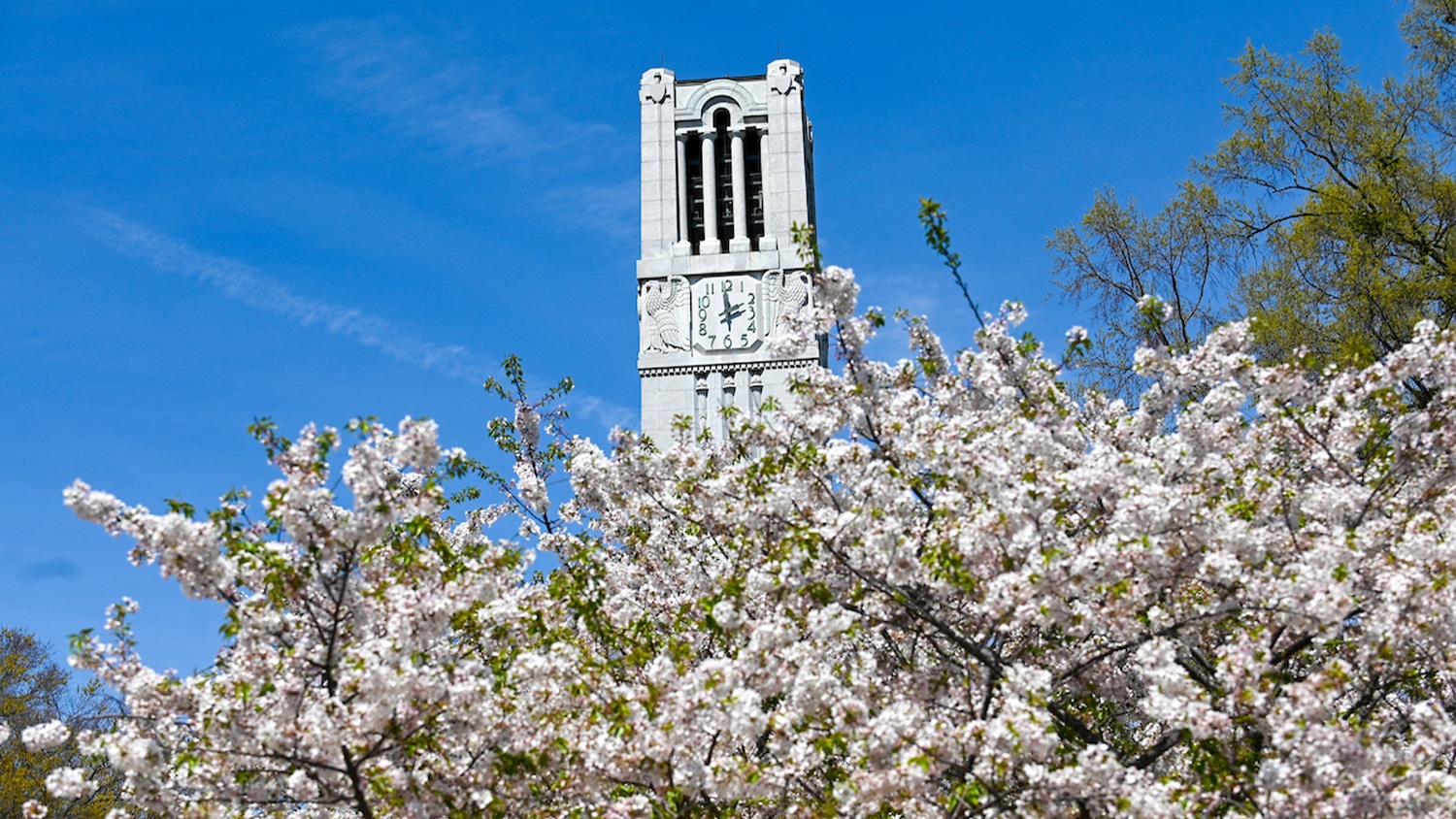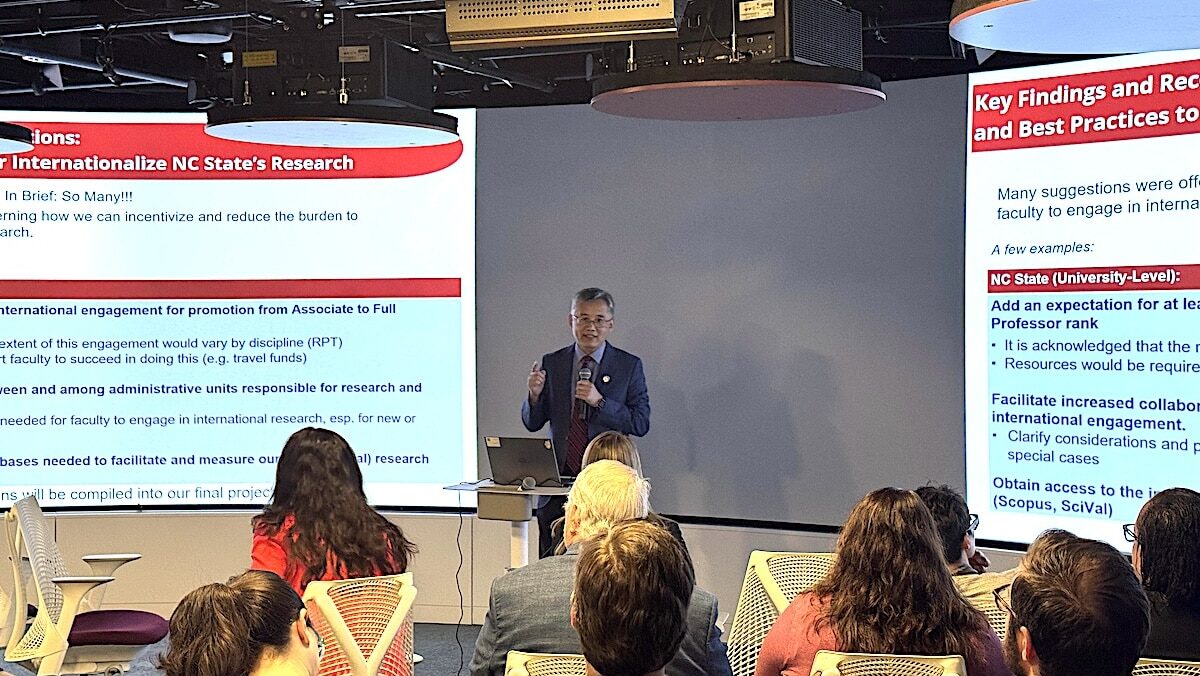Q&A: Supporting Our Students’ Mental Health
Counselor Luke Strawn helps Sciences students navigate the stressors of university life.

It’s well-documented that students at colleges and universities are facing unprecedented challenges. Societal pressures, crippling anxiety and the continuing impact of COVID-19 have created an extraordinary need for student mental health services.
College of Sciences embedded counselor Luke Strawn has spoken with scores of students since arriving on campus last year. Strawn is a key part of the Ag and Sciences Wellness Program, a new student mental health partnership between the College of Sciences, the College of Agriculture and Life Sciences and the NC State Counseling Center. He discussed his work, the pressures facing students in 2023, and how parents, friends and loved ones can help those in need.
Tell us a little bit about your background and why you became a counselor.
I hadn’t really considered becoming a counselor until April 2009, when a close friend lost a loved one to suicide. In the following months, I became engrossed with the idea of holding space — giving support in a judgment-free way — for the struggles of others. Was there a little bit of, “I’m helping myself by helping others?” Maybe. But I also found beauty in the stories shared and the healing that was possible.
Since that time, I have experienced my fair share of tragedy and have held the space for clients to share and process theirs. In these spaces I have found so much warmth in the light of persistence that my clients have shown. I’m so grateful that I get to be present in their anger, their distress, their healing and their growth. It’s a beautiful space and I’m grateful this now gets to be my permanent work.
It’s been a stressful few years for students. What are you and other university counselors seeing that you didn’t see a few years ago?
We’re now seeing a range of concerns that would have been difficult to anticipate. Acknowledging that this may sound like a sweeping generalization, we are seeing the long-term impact of COVID-19 as it relates to social anxiety, imposter syndrome, perfectionism and social development. While students were — and often continue to be — hesitant to show up in physical spaces due to health reasons, we are now also seeing that happen due to social stress and imposter syndrome.
“My suggestion for those who want to help … Reach out. Check in on the people in your life, and then listen to what they have to say.”
We’re certainly seeing the creation of more counseling services — embedded roles like mine are proof of that — and it’s amazing that so many are seeking support. It means there are conversations happening and that mental health is becoming less stigmatized. However, we are also seeing an increase in requested services that are outside of our scope of care. Whether this is due to reduced stigma, unhealthy coping patterns during the first few years of COVID-19, or something else entirely, it’s hard to say.
What are some particular stressors faced by college students?
A Healthy Minds survey from Fall of 2020 indicated that out of a sample size of approximately 1,000 students at NC State, about 30% provided responses that met criteria for anxiety and/or depression. This isn’t solely an NC State concern. This isn’t even solely a college concern. It’s a national concern. However, it is clear there are some specific stressors that college students face, even more so when we break down intersectional identities of race, ethnicity, sexual orientation, gender identity and religion. When we look at students with marginalized identities and intersect those identities with considerations of socioeconomic status, support system, first-gen status, graduate vs. undergraduate status and more, it’s clear that students have stressors that are both quite common and quite unique.
And, of course, these factors don’t take into account the long-term impact of COVID-19 as it relates to job opportunities, living wages, the housing market and other factors. College students are now navigating a world of uncertainty, continuous adjustments and ambiguous expectations. These can lead to an overextended need for control, thus creating unrealistic expectations for academic performance. The adjustment to college — finding your community, adjusting to more rigorous coursework, developing an understanding of yourself — has become much more challenging in the past three or four years, as has the transition out of college.
What can parents, alumni, fellow students and others do to help students struggling with their mental health?
I typically ask every client two questions during an intake: 1) Who makes up your support system? and 2) How likely are you to reach out to them?
It’s interesting to hear students list a wide range of loved ones in their lives, but then follow that with a statement like, “I barely reach out to them, if at all, because they have a lot on their plate and I don’t want to be a burden.” My suggestion for those who want to help is one that they may have heard before but needs to be emphasized: Reach out. Check in on the people in your life, and then listen to what they have to say. There are some signs of distress that are noticeable, but there are others that can be masked quite well. If nothing else, reaching out sends the message that you are someone who wants to hear from someone who is struggling.
Here are a few practical strategies:
- NC State Prevention Services facilitates QPR (Question, Persuade, Refer) courses, which teaches individuals how to recognize and respond to signs of suicide.
- Finally, if you have a concern about a student, you can submit a CARES referral form. Your name does not need to be attached to these forms, although that can be helpful. The CARES Referral Form allows our CARES team to offer support to students who may be struggling in certain areas as it relates to mental health, food/housing insecurity and general wellness.
How should students get in touch with you?
The easiest way to get in touch is to email me at lrstrawn@ncsu.edu. My office is in Patterson Hall 107A. I meet with students both in-person and virtually for individual appointments. Students can also swing by in-person or virtually during drop-in hours, which are currently on Tuesdays from 3 p.m. to 5 p.m. and Wednesdays from 10 a.m. to 11 a.m. in the Bureau of Mines building. In these sessions I provide brief counseling support and we go through a quick triage, like an express lane at an amusement park, to get students set up with services at the Counseling Center such as individual therapy, group therapy, and workshops. I should note that students will still need to fill out some paperwork, but my hope is to reduce that barrier as much as possible.
I am also happy to speak with faculty/staff, classes, clubs and organizations. Any request can be made through our Ag and Sciences Wellness Outreach Form.
What if students want to speak with another counselor?
While I am the embedded counselor for the College of Sciences and the College of Agriculture and Life Sciences, we have other counselors on staff if you have a preference for a counselor as it relates to gender identity, race and/or ethnicity. Comfort within sessions is incredibly important and we want to make sure we meet those preferences to ensure the best therapeutic experience. This can be noted in our Request for Services form. If you do not list any preferences, they will more than likely assign you to meet with me.
Students can also visit the Get Started page on our Counseling Center website, which has information about forms to fill out and scheduling a triage appointment. Of course, students with a mental health emergency should call 919.515.2423. If the emergency is after regular business hours, students should select option 2 after calling to speak with the on-call counselor. And in the case of a life-threatening emergency, call 911.
- Categories:


